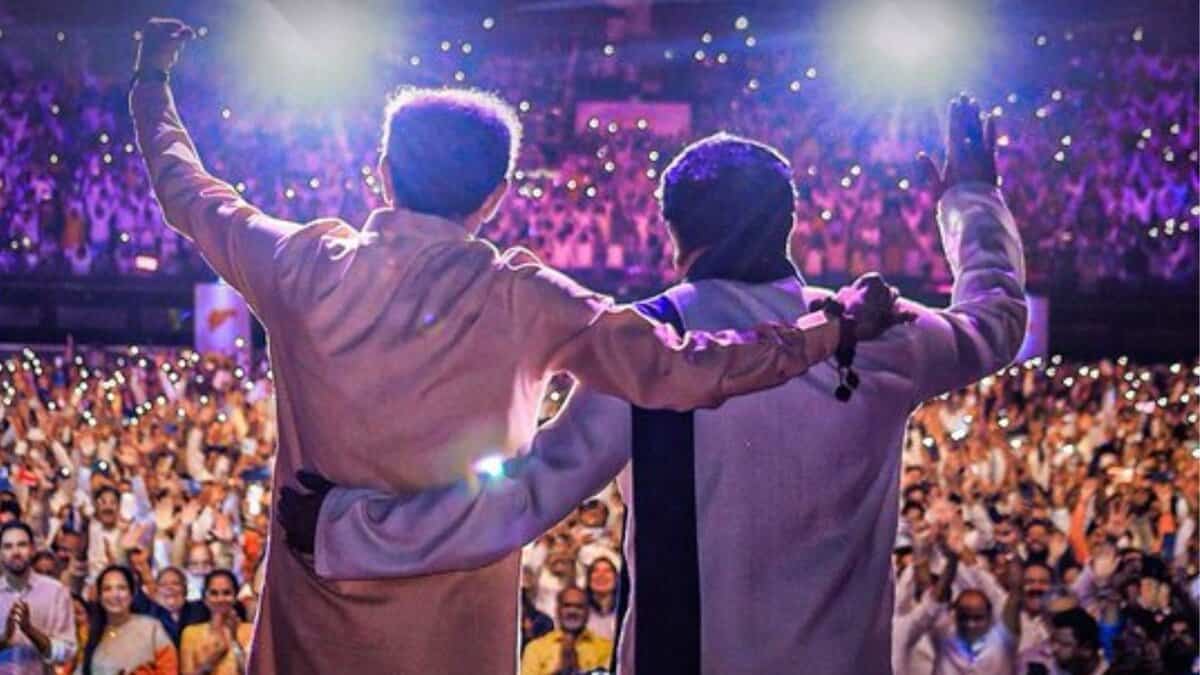
It is a family reunion in Maharashtra with a huge political impact with the estranged cousins of the Thackeray family getting together. Uddhav Thackeray and Raj Thackeray buried their hatchets on Saturday. They did so in the presence of thousands of teary-eyed followers who had a common cause: the interests of the Marathi-speaking population of the state. They cheered them on when the cousins, their respective wives, and children, posed for a picture.
There have been hints aplenty about the two coming together for politics with the wrapper of politics but even now it is unclear how the two cousins would work out their intra-family and inter-political dynamics.
Will they merge? If they did, what would be the internal equations?
Have details been worked out? Would it only be an alliance? Uddhav had declared that they “came together to stay together”, a promise that the cadres were keen about. More than the two families, the Maharashtrian had been anxious to see the two together.
The only other reunion, if at all it happened, would be between the two factions of the large political clan of the Pawars and upset the political landscape of Maharashtra, at least in the medium term. If that were to transpire, either Ajit Pawar and his team would have to abandon their alliance with the Bhartiya Janata Party, or Sharad Pawar accept the BJP and become a part of the current ruling establishment. If the former happens, the government can fall if the latter, claimed ideologies would crumble and reputations sink.
The two cousins had met only at Bal Thackeray’s funeral in 2012. They did not reconcile even at that time the founder had wanted Raj to return to the family and political fold. Little wonder Raj pricked Devendra Fadnavis at the reunion rally. “What Balasaheb could not do” – reunite the cousins – “Devendra Fadnavis has done.” That was by bringing in a policy which made Hindi compulsory from Standard I. Both cousins saw it as an “imposition” and announced a rally. The government withdrew it and announced it would be limited to familiarisation with language without books.
The two cousins had been at war since 2005 when Raj walked out of the Shiv Sena even when Bal Thackeray, the patriarch and founder of Shiv Sena was alive but had anointed Uddhav the heir apparent; Raj had wanted to succeed the patriarch. But during the years before 2005, there was enough internal wrangling for Raj to complain in November 2005 that he was “insulted” and “humiliated” and “no worst enemy” should suffer such pain. Thereafter, he set up a new party, Maharashtra Navnirman Sena (MNS). It did not reach the heights that the Shiv Sena had achieved.
This reunion has the potential now to help the Shiv Sena and MNS to transcend the Hindutva aspect of the two parties by making Marathi a draw for the voters. This should worry the Bhartiya Janata Party. Marathi is an emotional thing which ties the community of its users together and serves as an expression of their identity, asmita. After all, the linguistic division of the1960s had promoted sub-nationalism, and the feeling is strong in Maharashtra. This would be tested in the forthcoming elections to the local bodies, especially in Mumbai.
Mumbai, however, has a limited number of Marathi speakers, limited to some 35 per cent of the population because of continuous migration from other parts of the country. This migration appears to have slowed down but increased in other towns and cities, and the ire of the Sena and MNS is at those who speak other languages; one can get by in major cities without speaking Marathi. In Mumbai, Hindi would suffice to go about one’s business, any business which irks these parties. At one time, Hindi speakers had demanded that Mumbai’s civic body transact its business in Hindi. It didn’t happen; Shiv Sena was ruling the civic body.
The Shiv Sena came into being to protect the employment opportunities of the locals when white-collar jobs were being taken by the educated South Indians, especially in Mumbai. Now, the migration from other places, especially Uttar Pradesh and Bihar has led to the growth of the service sector because the Maharashtrians were unwilling to take up jobs that the migrants were willing to perform. The Maharashtrian underclass also thought that jobs were their right, not something to be secured by being qualified to do it. Until recently, they did not want to drive auto rickshaws. It is changing.
While getting local bodies under their belt, political parties strengthen their bases for future electoral gains. In that scenario Mumbai is a prime target because it is not only the richest in the country but has budgets that would shame many smaller states. It has many benefits that the nexus between the politicians, the officials, and the contractors generates year after year. That makes Mumbai the most prized civic body. Other cities are also full of opportunities. Mumbai offers many bigger ones. This getting together helps.



